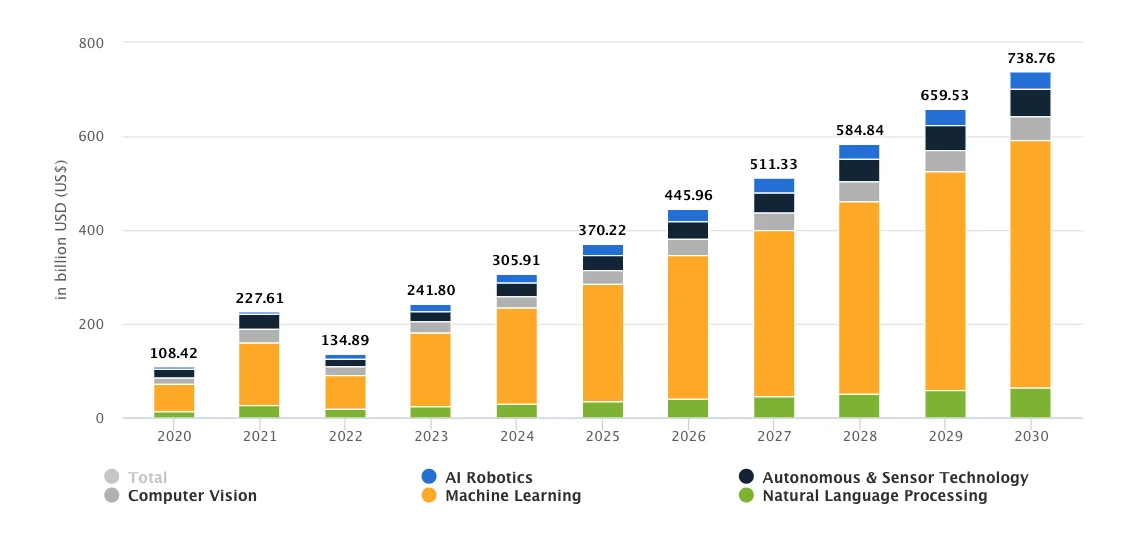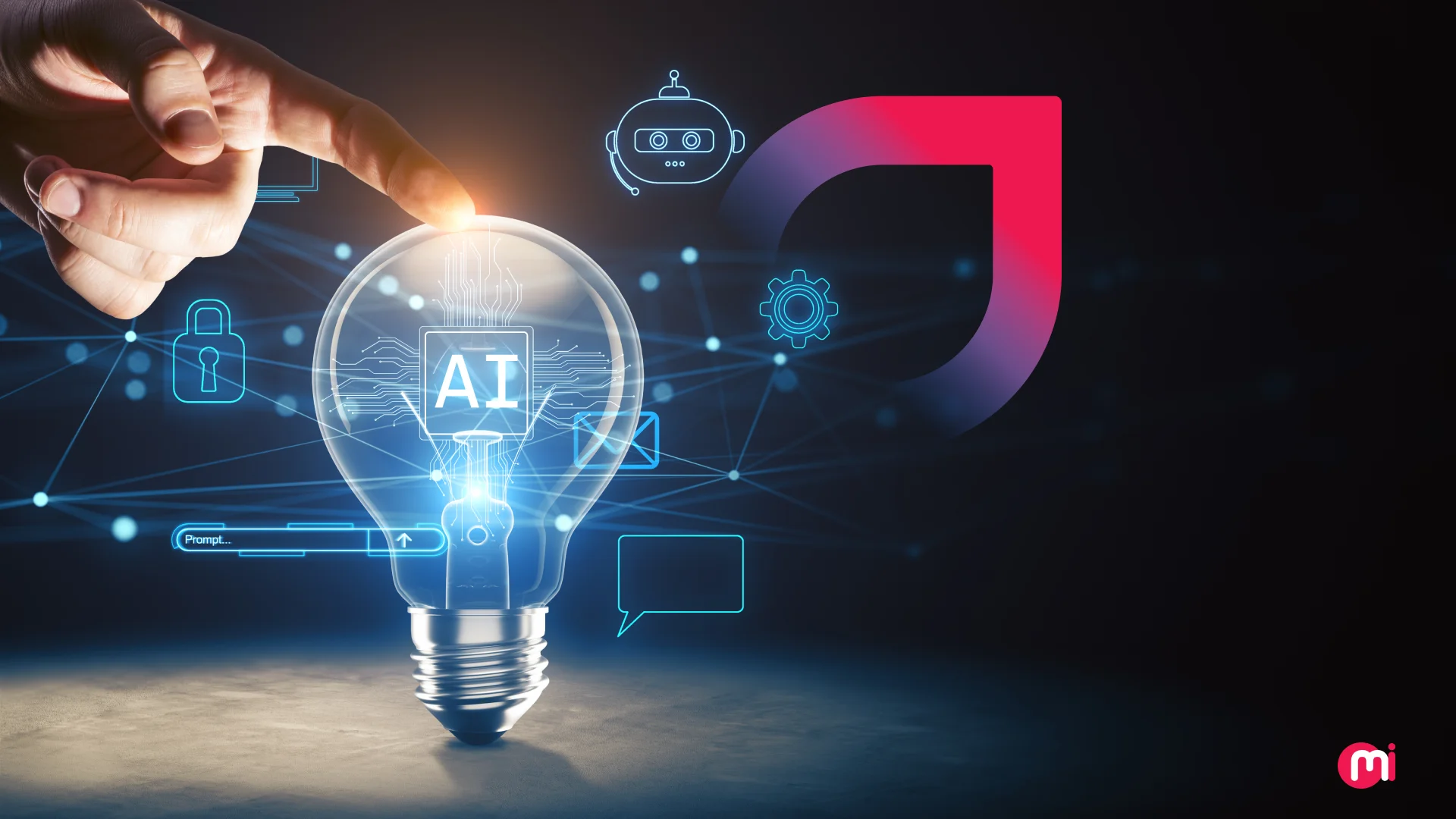What Is The Role Of Artificial Intelligence In Digital Transformation?
- AI/ML
- March 11, 2024
AI is the present that we all must accept as it offers numerous perks, particularly to businesses on the path to digital transformation. However, to fully leverage the potential of AI in digital transformation, businesses must explore its roles and the latest trends. Recognizing the essential role of AI in business IT architecture, we have crafted this blog, shedding light on real-world AI applications, their impact, and trends to adopt for enhanced business opportunities.
In today’s dynamic landscape, digital transformation (DX) is not just a trend but a necessity to thrive in this demanding market and offer users the ease to do many things with minimal effort. Many believe that when ascending for digital transformation, AI can be the boosting force behind it.
From image/video analytics with computer vision trends for various purposes to ChatGPT like Generative AI trends boosting innovation and productivity, we have seen AI reshaping the way business operates. The evolution of AI doesn’t stop there, nor does its increasing adoption.
As per the Statista survey, the AI market size is expected to reach USD 305.90 billion by 2024 and further extend to USD 738.80 billion by 2030 at a CAGR of 15.38%.

Seeing the potential of AI, tech enthusiasts say it is the key to everything, but is it for digital transformation? Can AI be an essential strategy for businesses to navigate their journey to digital transformation? These are not just mere questions; they are the gateways to AI-driven digital transformation for businesses to thrive.
But how does AI play its part in the digital transformation? That’s precisely what this blog is about.
How Does AI Contribute to Digital Transformation?
Digital transformation involves the integration of diverse digital technologies to create an interconnected ecosystem that enhances efficiency, collaboration, and innovation across an organization. When these digital business solutions, processes, strategies, and customer interactions are integrated with AI, they are formed into AI-driven digital transformation.
As per the Accenture survey, around 13% of AI innovators have mature AI strategies in place and are yet to figure out use cases, whereas only 12% of companies have utilized AI to a very extent in their digital transformation efforts and are reaping good ROI.
Hence, it becomes essential to figure out the applications of AI or AI technology trends for digital transformation and the ways they contribute to your business’s success.
Process Automation
In this fast-forwarding business landscape, having process automation minimizing efforts in repetitive, mundane tasks is more like a blessing for businesses. While many fear AI from being replaced, AI brings many benefits to the table. From those, process automation stands in front.
Businesses can implement RPA solutions like bots for automating rule-based, repetitive tasks, freeing up Human Resources to focus on more strategic and creative activities. These RPA-driven tasks include automation of data entry with accuracy, invoice processing, payroll processing, reconciliation tasks, ticketing systems, streamlining customer support processes with integration to CRM systems, order processing, inventory management, shipment tracking, insurance claiming processing, and a lot more.
| Spotify app – a leading on-demand music streaming platform of our time is leveraging enterprise RPA solutions in the form of unattended bots that don’t need human oversight. With its adoption, it has integrated over 100 bots in operations for continuous music listening habit monitoring and personalizing users’ streaming experiences. To date, with RPA bots, it has saved over 45,000 hours and availed of over 24,000 hours of staff capacity to work on advanced operations to improve its user experience to the next extent. Not just that, automating operations for personalizations, specifically for ads (for personalized content, buttons, and banners) delivered them 53% increase in click-through rates. Without a doubt, Spotify is expanding its commitment to automation with RPA. |
Not just in terms of accelerating efforts in digital transformation, the implementation of AI and ML in business processes offers an extra hand to make the most of their time through process automation.
Data Analytics and Personalized Customer Experience
Nowadays, data is the biggest asset any entity could have. The more the data, the better decisions and future possibilities businesses can think of. When it comes to harnessing the strength of data, AI comes forward to help.
When making digital transformation using AI, it enables businesses to harness the potential of data for advanced analytics, insights, automation, and customer experience improvements. Now, let’s check out possible ways AI plays its role in data analytics and improving customer experience.
- Predictive Analytics: Using AI to automate analyzing historical data and identifying patterns and trends to take actions for better future outcomes and achieve a competitive edge.
- Recommendation Engines: Continuously working machine learning models that process real-time data, provide recommendations, and even take actions based on predefined rules or learned patterns to improve customer experience with your digital service platforms.
- Customer Sentiment Analysis: AI analyzes customer feedback and sentiment from various sources and provides businesses with insights to understand customer opinions and preferences and use them for better brand marketing and service prepositions.
| Did you know? Amazon utilizes a recommendation system to boost customer engagement and increase sales. The fun fact is, 35% of sales come from product recommendations. |
AI-powered Customer/User Support
What do customers want from any company they buy services from? To get a dedicated customer support service to reach out to the service provider whenever they are stuck somewhere or need some assistance. But not all businesses have that type of flexibility to provide round-the-clock services. On the other hand, some businesses are already loaded with tons of workloads and unable to reply to customer queries on time.
Moreover, 72% of customers expect businesses to respond to their queries/complaints within an hour.
No matter in which category your business falls into, developing and integrating an AI-powered chatbot like Replika on your website, digital platforms, or in-house ERP can empower you to offer a better user experience. These chatbots are implemented with NLP, data analysis, speech recognition, machine learning, dialogue management, and generative AI with RAG (Retrieval Augmented Generation) capabilities to offer users elevated interaction experiences like talking to human executives.
By implementing AI chatbots in your digitized platforms, like websites, and online platforms – you can level up your digital transformation game intelligently.
As a bonus feature, you can also implement an AI voice assistant for your mobile app to offer users accessibility to navigate the app through voice commands as we helped with I.AM+ – super app.
Generative AI
The debut of ChatGPT like generative AI tools in the digital realm has created a buzz with its exceptional power to generate content and help users in their creative journey with ideas. From content creation to application code development along with generating visuals from prompts or rough sketches, today, generative AI is capable of doing a lot we can imagine.
Businesses spanning their journey in digital transformation can harness the potential of generative AI by utilizing the power of architectures and models like RAG, Large Language Models (LLMs), diffusion architectures, and transformers.
Skilled users knowing the appropriate use of Generative AI for various business operations can boost productivity by 40%.
In one survey, Salesforce revealed that around 75% of users use generative AI to automate their tasks at work, specifically the communication part. 68% of users believe generative AI adoption or integration in their customer support channels can help them serve their customers better.
By building autonomous AI agents, multi-modal virtual assistants and customer support, automated content generation, conversation Intelligence, and various other custom Generative AI solutions, businesses can boost their productivity and focus more on business.

Computer Vision
From intelligent security surveillance, facial recognition, and object detection, to visual analytics, we have seen many successful applications of computer vision across industries. It leverages the capabilities of machines to interpret and understand visual information and offers organizations various use cases to adopt to automate their specific visual-based tasks and achieve better work efficiency.
If we look for different industries, then:
- Healthcare can harness the power of computer vision for medical imaging analysis, health monitoring, patient monitoring and tracking, and other custom solutions.
- Real Estate can utilize computer vision software development services for remodeling applications for interior and exterior planning, property damage assessment, spatial and land use planning, and more.
- The finance industry can implement computer vision for applications like fraud detection, security & surveillance, and customer authentication.
- Security and Surveillance domain can make the most computer vision for their requirements, like intruder detection, facial recognition for access control, and public space monitoring.
- Insurance firms can use computer vision for object damage assessment, claims processing, and risk management.
- The food & fitness industry can use computer vision to allow customers to detect food ingredients, their nutritional values, and more that can help them in their diet.

What’s the Future of AI in Digital Transformation?
As we peer into the future, the roles AI will play in digital transformation are poised to reshape the business landscape profoundly. Here’s a glimpse of what lies ahead:
- AI will evolve to the level where hyper-personalization will become possible, tailoring user experiences with unparalleled precision. From predicting content recommendations to offering services that customers would definitely anticipate, AI-driven hyper-personalization has the power to make users loyal to your online offerings.
- From supply chain logistics to customer interactions, businesses will harness AI to streamline operations.
- Utilizing the power of Generative AI, businesses will be able to automate and streamline the software development lifecycle for rapid prototyping, development, and integration, including testing and proactively finding bugs and opportunities to improve app performance.
- AI will evolve to be an accelerating force for ideation and development. Contributing with humans can lead them to achieve more effective problem-solving, creativity, and efficiency in various domains.
- From optimizing energy consumption to reducing environmental impact, AI will be the driving force behind developing eco-friendly solutions.
In short, businesses that harness the full potential of AI will not only thrive in this transformative landscape but also pioneer new frontiers in their respective industries.
Are you stuck when deciding to invest in a business powered by AI? Explore this informative blog to learn the top AI business ideas with real-life examples.
How Does MindInventory Empower Businesses With AI For Digital Transformation?
From revolutionizing process automation to giving a boost to innovation, AI has evolved a lot. Businesses utilize it as a digital transformation asset to data-driven strategic help for influencing decision-making, elevating customer experiences, and leading businesses toward the next level defined by adaptability and intelligence.
As businesses embrace AI, they must commit to ensuring transparency, fairness, and data privacy, ensuring that the revolutionizing power of AI is being harnessed responsibly.
Considering that, At MindInventory, we recognize the potential of AI and become a guide for businesses ascending their journey to digital transformation through AI. From offering strategic AI consultation to custom AI solutions, we assist businesses every step of the way in their journey dedicatedly with our expert-led digital transformation services.
So, need a team of AI experts to fuel your digital transformation journey? Let’s partner up.
FAQs about AI in Digital Transformation
AI-driven transformation is a process that leverages various Artificial Intelligence (AI) technologies to bring significant changes to various areas and functions of your organization.
AI transformation is trending across industries for several compelling reasons, including its ability to enhance efficiency and productivity, data-driven decision-making, innovation and competitive edge, customer experience, adaptive learning and continuous improvement, effective risk management, and a lot more.
Well, there’s no barrier for industries to not adopt AI to improve their functions. However, speaking for the wide adoption and applications, AI has shown impressive outcomes in industries like finance, healthcare, retail & e-commerce, real estate, and transportation & logistics.
Integrating AI into business involves a strategic approach: assess objectives, prep data, define use cases, select AI tech, implement models, integrate with systems, and continuously improve. For seamless AI integration, you need to hire AI developers, which you can leverage from the AI team of MindInventory.







